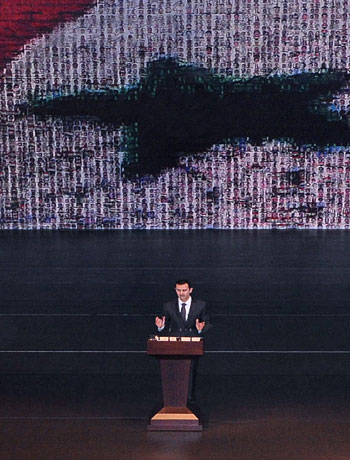
A handout picture released by the official Syrian Arab News Agency (SANA) shows Syria’s embattled President Bashar al-Assad making a public addresson January 6, 2013 at the opera house in Damascus. (AFP)
London, Asharq Al-Awsat-According to a high-level Syrian National Coalition member, the Syrian opposition umbrella group is prepared to negotiate a departure for President Bashar al-Assad with any member of his government who has not participated in the violent crackdown against the revolution.
Syrian National Coalition president Moaz Alkhatib had initially expressed his readiness to talk to representatives of the Assad regime on condition that they release 150,000 prisoners and issue passports to tens of thousands of displaced Syrians. This proposal, formulated without consulting the coalition, initially draw sharp criticism from the opposition’s exiled leadership in Cairo. Alkhatib has also lately met with Iranian Foreign Minister Ali Akbar Salehi, Russian Foreign Minister Sergey Lavrov, and US Vice President Joe Biden, seeking an end to the Syrian crisis.
The Syrian National Coalition leadership’s position towards Alkhatib’s initiative softened after it became clear that there would be no negotiations with Bashar al-Assad directly, or any member of the Syrian regime with blood on their hands.
Following an overnight meeting of the coalition’s 12-member politburo in Cairo, the opposition leadership endorsed Alkhatib’s initiative, but set guidelines for any potential peace talks. These guidelines are set to be presented for approval to the full 70-member Syrian National Coalition assembly on Thursday.
Syrian National Coalition politburo member Walid Bunni told Reuters, We are willing to negotiate with any civilian official the removal of Bashar and the end of despotism. He stressed that Assad and his cohorts in Syria’s military and intelligence apparatus cannot be part of any future negotiations.
He said, Bashar and his cohorts will not be party to any talks. We will not regard those present from the government’s side as his representatives. However Bunni did concede that members of Assad’s Baathist Party, which has ruled Syria since 1963, can participate in the proposed talks if their hands are clean of blood. In the first direct government response to proposed talks, Syria’s national reconciliation minister Ali Haidar said that he was prepared to travel abroad to meet Alkhatib. He said, I am willing to meet Mr. Alkhatib in any foreign city where I can go in order to discuss preparations for a national dialogue. Haidar told Britain’s Guardian newspaper that dialogue is a means to provide a mechanism for reaching free parliamentary and presidential elections. This is one of the subjects which will be discussed at the table. Such a thing could be the result of negotiations, but not a precondition. However he also stressed that we reject a dialogue that is just to hand power from one side to another. UN Secretary-General Ban Ki-Moon and UN-Arab League mediator Lakhdar Barahimi both called on the UN Security Council to respond positively to Alkhatib’s offer of talks. Speaking to the press in Washington on Thursday, Ban Ki-Moon said, Brahimi and I are calling (on) the Security Council to be united and speak and act in one voice. He added, We support the initiative by Moaz Alkhatib, head of the Syrian National Coalition, for dialogue with Syrian authorities. This is an opportunity we should not miss. These developments come as the United Nations reported that approximately 40,000 people fled a town in eastern Syria after three days of heavy clashes between troops loyal to Syrian president Assad and rebels seeking to topple his government.
Reports indicate that Syrian rebels seized the town of al-Shaddadeh in Syrian on Thursday following fighting which resulted in the deaths of some 30 rebels and more than 100 Syrian soldiers.
“A WFP (World Food Programme) team visited the area and estimated that around 40,000 people have fled al-Shaddadeh to al-Hasakah city (the regional capital),” the U.N. agency told journalists in Geneva on Friday.
WFP spokesperson Elizabeth Byrs revealed that there are high rates of malnutrition among children in the region, particularly as north-eastern Syria was hit by four years of drought before the uprising against President Assad, which is approaching its second year.
She said, The fighting and displacement only aggravates the misery of these people” adding that the WFP has sent extra rations to the area this week to help alleviate the people’s suffering.

Syrian rebels fire a rocket towards regime forces stationed at Kwiriss airport in Al-Bab, 30 kilometres from the northeastern Syrian city of Aleppo, on February 14, 2013. (AFP)

Ahmed Moaz al-Khatib, the leader of the Syrian Opposition Coalition, is pictured at the Munich Security Conference on February 1, 2013. (AFP)
